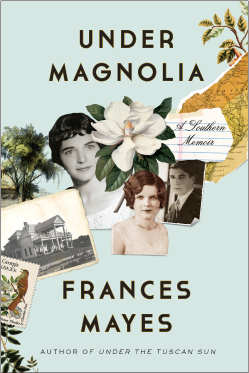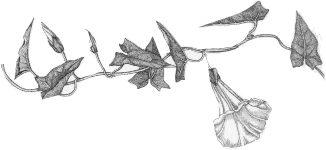Bella Tuscany (29 page)

Â
I wander at night, too. Ed and I have walked into town for a
gelato
and he starts a long conversation with Edo about installing lawn irrigation. Our wild-herb lawn has not survived the summer drought, though fall rains will bring back the green hills. Out of chat, I start back, walking over the Roman road with a flashlight, then down onto the cypress-lined road toward home. Before it was paved, the white pebble
strada bianca
used to reflect the moonlight. Now with the asphalt and the
luna nera
, black moon, the road is dark, the cypress trees seeming to gather into their massive shapes all the light from the stars. I have the ambition to see every cypress tree in Tuscany. Like the California oaks in the Bay Area countryside, the cypresses seem to speak for the landscape. The bare oaks of California interact with light, giving their skeletal shadows to the hills and their silhouettes to the sky.
But the cypresses play no games with light. If they were in the sky they would be the black holes and if I were in America, I would be petrified to be alone on a deserted road at night. Because each of these trees was planted for a local boy who died in World War I, they are huge presences, not only in form but in a silence stopped inside their fixed curves, something of the unlived life of each boy. The tips, pointed like sable paintbrushes, wave back and forth against the stars.
Hot from the climb over the hill, I unbutton my blue linen dress all the way down and let it lift behind me.
Oh, for a life of sensation,
our friend Keats also told us. The cypress trees are grand companions. If anyone were coming, I would hear them because sound carries along the mountain, like the last sigh of the gladiator in the amphitheater heard on the last row. Around the curve, the house rises above the road, a rough translation of my body into a mute language of windows, doors, and stone. Ed, I think, is translated by the olive trees and vines, which now droop with dusty purple grapes.
From the yard above the road, I see the cypresses graph a rise and fall against a sky blown clean of clouds by this afternoon's wind. Stars are shooting over the valley, stars that fell even before the Etruscans watched from this hillside. I recognize the cadence of Ed's step below in the road. “Are you home?” he calls up to me. Five, six, stars streak across the sky. I hold out my hand to catch one.
Frances Mayes is also the author of
Under the Tuscan Sun,
a companion volume to
Bella Tuscany; The Discovery of Poetry,
a text for readers; and five books of poetry, most recently
Ex Voto.
A frequent contributor to food and travel publications, she divides her time between Cortona, Italy, and San Francisco.
Acclaim for
Bella Tuscany
This new book by the author of
Under the Tuscan Sun
charts the transformation of a house into a home, a process that has less to do with stones and paint and plants and arbor than it does with the spirit settling into a place, weaving itself into the fabric of a place . . . [Mayes] ponders secret gardens and language and Italian food and family . . . and the nature of happiness. (I think we all like reading her because she seems, quite simply, to have a knack for happiness.)”
â
Los Angeles Times
[Mayes's] mind is exquisitely in tune with Italy . . . And that makes for, undoubtedly, sweet reading.”
â
Atlanta Journal-Constitution
Here is the ideal book to have with you when trapped in an unpleasant atmosphere . . . Inside its pages is where you'd rather be, transported to the sunlight, hills, gardens, local people and, especially, the food of Cortona, Italy.”
â
Courier-Journal,
Louisville
Mayes forms tantalizing connections between culinary experiences in her rich childhood in rural Georgia, her adult life in San Francisco, and the senses and tastes discovered in vineyards, farmhouses, and trattorias. With an engaging breathlessness, she guides readers through spring and summer when Italy is lusty and voluptuous.”
â
Tampa Tribune and Times
Mayes's extraordinary sense of visual detail, her veritable hoarding of images, is spiced by her equally acute flair for language.”
â
Baltimore Sun
Who could fail to affirm this poet's lush descriptions of the rolling Tuscan hills with their timeless olive trees and patient oxen . . . Lovely, and no small consolation to anyone who's far from Tuscany.”
â
Kirkus Reviews
For people who have had too many âorder out for Chinese nights,' and âseventeen-messages-on-the-machine nights,' here's proof that there's a place where one can live slowly and fully, enjoying the âdaily rhythms of life'.”
â
Condé Nast Traveler
Mayes writes with a poet's attention to sensuous detail, whether describing a six-course meal, a fresco in a little known church, or the challenges of learning Italian. She describes village life with all its warmth, friendliness, and individuality, in sharp contrast to the growing homogeneity of America.”
â
Library Journal
It's easy to understand why [Mayes] has become a kind of cult figure for seekers of The Good Life. She not only inspires us to seize the moment, sip the wine and smell the roses, she also makes us feel it is quite possible to transform our lives, just as she did.”
â
Lexington Herald-Leader

Read on for an excerpt from
New York Times
bestselling author Frances Mayes's latest memoir,
Under Magnolia


Crown Publishers
Available wherever books are sold
Â
 A SILVER GLOBE IN THE GARDEN
A SILVER GLOBE IN THE GARDENAs I open a book that I once pulled from the ashes of my grandparents' house, the dusty, mildewed scent catapults me to their back hallway.
Through the double door, made of tiny mullioned panes, I see the entrance hall waver, a quivering of claret and sunlight from the front door. Wafting from the kitchen, the smell of chicken smothered in cream and pepper until it's falling off the bone. I'm playing an ancient wind-up record left over from when my father was a boy; “K-K-K-Katy” crackles in my ear. Through my grandmother's open bedroom door, I glimpse chintz dust ruffles, hatboxes, the slender oval mirror over the dressing table, where she leans, and I see her dab the fluffy puff between her legs.
That's it: brief cloud of bath powder, grinding consonant K-K-K-Katy (
I'll be waiting at the k-k-k-kitchen door
), warped light throwing rainbows back through the door. And I wonder, always, why do such fragments remain forever engraved, when, surely, significant ones are lost? The kitchen fragrance, no mystery. For who, ever, could forget Fanny's smothered chicken?
An early memory of my father: He opens his buff hunting coat, and in all the small interior pockets, doves' heads droop. He and his friends Bascom and Royce break out the bourbon. From my room in the back of the house, right off the kitchen, I see through the keyhole (keyholes are a large part of childhood) the doves he's killed piled on the counter, and someone's hand cleaning a shotgun barrel with a dishrag. The terrible plop-ploop sound of feathers being plucked makes me bury my face under the pillow. When his friends go, my father stays at the table with his tumbler of bourbon. I'm reading with a flashlight under the covers. My specialty is orphans on islands where houses have trapdoors into secret passageways that lead to the sea. Rowboats, menace, treasure, and no parents in the story. As the water darkens and danger grows, I hear my father talking to himself. When I quietly crack the door, I see his head in his hands, his bloodstained coat hung on a hook. Very late, he hits the wall with his fist, and says over and over, “Beastly, Christly, beastly, Christly.” I put the palm of my hand over the spot where he is pounding with his fist and feel the vibration all the way up my arm. I press my nose to the window screen and look out at the still backyard.
A tea olive tree grows outside my bedroom window, its scent airy, spicy, and I prefer it to the dizzy perfume of the gardenias and magnolias that rule the neighborhood. Tough ovoid leaves scrape the screen; the tiny flower clusters are fit only for dollhouse bouquets. Then the back door slams and the car screeches out the driveway.
My father's parents live two blocks away. I like to gaze into the silver globe under the giant oak in their backyard. My face looks distorted and moony, especially when I cross my eyes and stick out my tongue. In the mirrored sphere, the yard curves back, foregrounded with oak branches like enormous claws. On the latticed back porch, my grandmother Mayes washes a bowl of peaches with her maid, Fanny Brown. Mother Mayes's hair is as silvery as the garden globe, and her crepey skin so white she's almost blue. She looks as though she might dissolve or disappearâher pale eyes always seem fixed on somewhere just beyond me.
Late in the afternoon, she puts up her bare feet on an ottoman. With the lamp haloing her hair, she's ethereal, but then I see crude, tough yellow corns on the last two toes of each foot. They're translucent in the lamp's glow, as she relaxes with
The Upper Room
, a church book of devotional reading, open on her lap.
Dove heads, tea olive, silver globe, bowl of peaches, church books. Images are the pegs holding down memory's billowing tent. From them, I try to figure out who my people were and where we lived, what they did and what they could have done.
South Georgia, where I was born, may look to a stranger speeding down I-75 like lonesome country where you can drive for miles without seeing more than a canebrake rattlesnake cross the road. At the city limits of our town a sign said
IF YOU LIVED HERE YOU'D BE HOME NOW
. The logic is irrefutable. Thin roads shimmering in the heat lead into Fitzgerald from Ocilla, Mystic, Lulaville, Osierfield, Pinetta, Waterloo, Land's Crossing, Bowen's Mill, and Irwinville, where Jefferson Davis was captured by the Yankees. Then, no I-75 existed.
